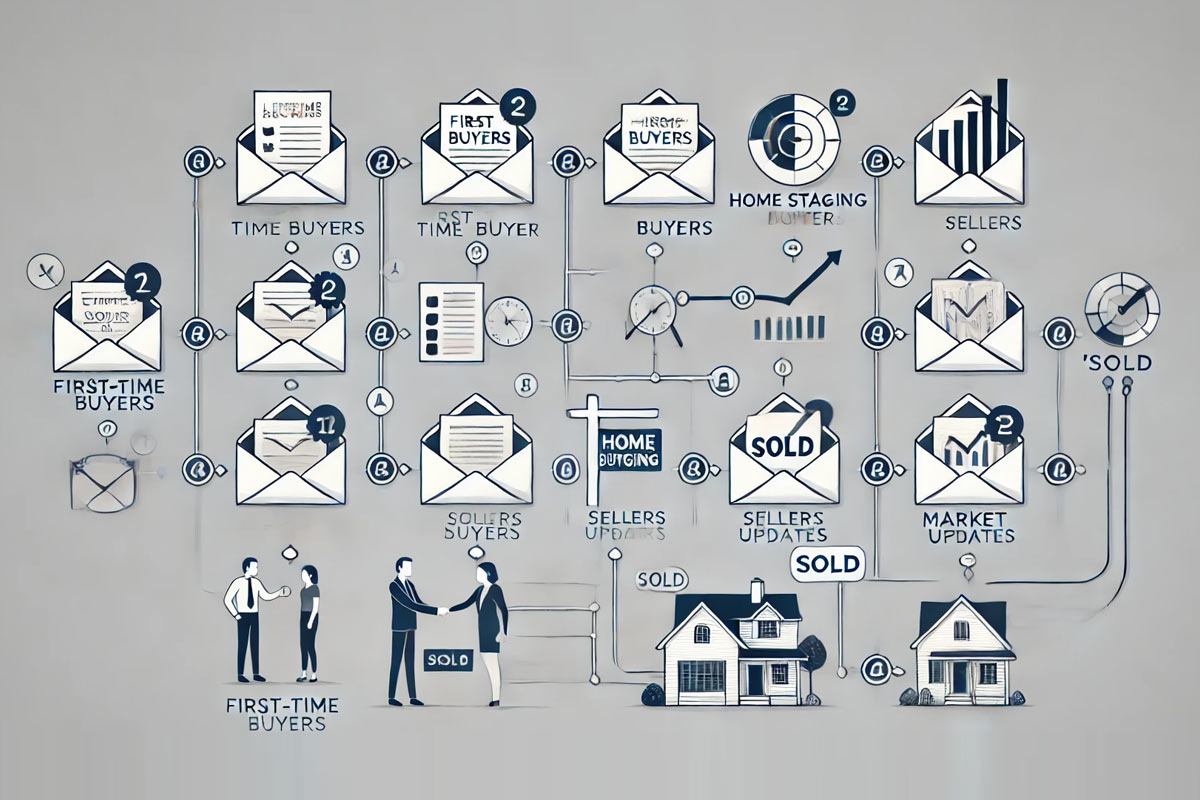Entering the real estate world and finishing your real estate classes is exciting, but landing those first few listings can feel daunting. I know you're putting in the effort, but even minor missteps can Read more...
Entering the real estate world and finishing your real estate classes is exciting, but landing those first few listings can feel daunting. I know you're putting in the effort, but even minor missteps can cost you valuable clients. Don't worry, I’m here to help! This article explores 12 common mistak
|
Read more...
Stepping into the real estate industry can feel like venturing into uncharted territory. One of the most pressing questions new agents grapple with is, 'Where do I find my first leads and clients?'
|

As a newly licensed real estate agent looking to build a robust client pipeline, you’ve likely heard the buzz about digital marketing channels—social media, paid ads, and content marketing.
Read more...
As a newly licensed real estate agent looking to build a robust client pipeline, you’ve likely heard the buzz about digital marketing channels—social media, paid ads, and content marketing.
However, email marketing is one of the most powerful, often underutilized tools at your disposal. Unlike social feeds that scroll by in seconds, emails land directly in your subscribers’ inboxes, offering a prime opportunity to nurture trust, credibility, and long-term loyalty. Through strategic, personalized emails, you can educate prospects, highlight your unique expertise, and position yourself as a go-to resource in your local market. Over time, these meaningful connections pave the way for loyal clients, repeat business and valuable referrals.
Email marketing is more than just a message—it’s your chance to build enduring relationships that translate into lasting success.
Why Email Marketing Matters for Real Estate Agents
Email marketing stands apart from other channels in several key ways. First, it’s personal. Your message arrives in a lead’s private inbox, free from the noise and distractions of social media. This direct connection lets you address subscribers by name, speak to their interests, and consistently provide valuable information.
Second, email marketing allows for pinpoint targeting. Not every lead is the same. Some may be first-time buyers who need help understanding mortgage options, while others are seasoned investors scouting their next opportunity. By segmenting your lists, you ensure your message resonates, increasing the likelihood of engagement and action.
Finally, emails support long-term relationship building—consistent messages filled with insights and educational content position you as a knowledgeable authority. Over time, this credibility makes clients more inclined to trust you when they’re ready to buy or sell—and more likely to refer your services to friends and family, instilling a sense of hope and optimism in the audience.
Building a Quality Subscriber List
A strong email strategy begins with attracting subscribers who genuinely care about what you offer. Quality outperforms quantity. Rather than stuffing your list with contacts with no genuine interest in real estate, focus on leads who find value in your expertise, reassuring the audience and boosting their confidence in their marketing strategy.
Create compelling lead magnets, which are essentially valuable resources or offers that you provide in exchange for a visitor's contact information. These could be a downloadable “10 Steps to Finding Your First Home” guide or a local market report that simplifies buying. Feature these offers prominently on your website’s landing page, social media posts, and in-person events such as open houses. Highlight the exclusive benefits subscribers will receive—early access to new listings, monthly tips on home maintenance, or insights into market trends. By emphasizing valuable content and sincere interest, you ensure the people on your list genuinely want to hear from you.
Crafting Engaging, Value-Packed Emails
The key to successful email marketing in real estate lies in delivering meaningful, easy-to-consume content. Start with a compelling subject line that sparks curiosity or promises immediate value: “5 Neighborhood Trends You Can’t Afford to Ignore” or “Your Quick Guide to Navigating Closing Costs.” Good subject lines can dramatically improve open rates.
Inside the email, keep messaging concise and organized. Use bullet points, short paragraphs, and strong visuals—such as property images, infographics, or charts showing market trends. Above all, deliver valuable insights, not just sales pitches. Share relevant statistics, offer practical tips, or highlight success stories from past clients who found their perfect home with your guidance. Add a clear call-to-action (CTA) that prompts readers to take the next step: book a consultation, explore a featured listing, or read a more in-depth article.
Segmenting and Personalizing Content
One-size-fits-all emails rarely inspire action. Instead, segment your subscribers based on their interests, homebuying stage, or other factors. For instance, first-time buyers might receive emails on understanding closing costs or securing the best mortgage rates, while sellers might see content focused on home staging and pricing strategies. Investors, on the other hand, might appreciate market forecast reports or rental yield calculators.
Personalization goes beyond using a subscriber’s name. Leverage customer relationship management (CRM) data to tailor content based on user behavior. If someone downloaded a guide on property investing, follow up with emails that explore up-and-coming neighborhoods or tax strategies. The more your emails feel like tailored advice rather than generic broadcasts, the more trust you’ll earn—and the more likely readers will be to engage and eventually convert.
Automating Nurture Sequences and Drip Campaigns
Automation can take much of the heavy lifting out of email marketing. Instead of manually sending emails individually, set up sequences triggered by specific actions. When a new lead subscribes to your list, automatically send a welcome email introducing yourself, explaining your services, and what they can expect from you. Follow up with drip emails over the next few weeks to slowly nurture the relationship.
A typical buyer drip campaign might include:
Step-by-step guidance on the homebuying process.
Timelines for due diligence.
Checklists for mortgage pre-approval.
Meanwhile, a seller sequence might focus on preparing a home for the market, understanding appraisal values, and maximizing the final sale price. When you introduce a call-to-action to schedule a showing or discuss listing options, your subscribers receive a consistent, credible value that warms them to work with you.
Establishing Authority and Trust
Your emails should reflect your expertise and position you as a trusted authority. Consider sending monthly market reports that simplify local real estate trends into easily digestible insights. Offer how-to guides for tackling common homeowner challenges or highlight local community features that make specific neighborhoods attractive.
Include stories of satisfied clients who overcame hurdles in their homebuying journey with your help. Share interviews with mortgage brokers, home inspectors, or interior designers. Host Q&A sessions via email or share recorded webinars that address common concerns. The more you present yourself as a knowledgeable, well-connected professional, the stronger your brand becomes—and the more credibility you create.
Measuring Success and Making Improvements
Data is your compass for continuous improvement. Track open rates (do your subject lines resonate?), click-through rates (are CTAs compelling?), and conversion rates (are leads taking desired actions?). Low open rates might indicate that you need more captivating subject lines, while poor click-through rates suggest that your content or calls to action need refinement.
Analyze unsubscribe rates to determine whether you’re emailing too frequently or providing irrelevant content. Implement A/B tests, a method where you compare two versions of an email or a landing page to see which one performs better, to compare different subject lines, email templates, or CTAs. Continuous monitoring and optimization ensure your email campaigns stay effective and align with your audience's evolving needs.
Advanced Strategies
Once you’ve mastered the fundamentals, consider taking your email marketing to the next level with more advanced tactics. A/B testing, for instance, allows you to compare two versions of a subject line, email copy, or CTA to see which performs better. You might test a data-driven subject line against one that highlights urgency. Over time, these experiments hone your messaging to resonate more deeply with your audience.
Another advanced technique is the use of dynamic content. With dynamic content, the email’s body can adapt based on subscriber attributes. For example, an investor might see rental property tips at the top of the email, while a first-time buyer might see mortgage checklists. This level of personalization enhances the reader’s experience and increases the likelihood of engagement.
Even if you are fresh out of real estate school, embracing email marketing as a newly licensed real estate agent can dramatically boost your visibility, credibility, and client conversion. By building a quality subscriber list, crafting compelling content, segmenting your audience, automating nurture sequences, and positioning yourself as a trusted authority, you’ll attract more leads and nurture them into satisfied clients who drive your business growth.
By embracing strategic email marketing, you’ll build a thriving, sustainable career that stands out in the competitive real estate landscape.
Love,
Kartik
|

Starting in real estate school and breaking into the real estate world can feel like stepping into a high-pressure and rapidly evolving industry. There are contracts to learn, open houses to host, and Read more...
Starting in real estate school and breaking into the real estate world can feel like stepping into a high-pressure and rapidly evolving industry. There are contracts to learn, open houses to host, and a constant stream of new information to absorb. Yet, amidst all the hustle, one cornerstone of success rises above the rest: networking.
It shouldn’t be surprising that building a strong network is essential for new agents. The intimidating question is “How do you establish connections when you're just starting out?”
The good news is that networking isn't about being pushy or overly polished; it's about forming genuine relationships. In this guide, you'll find practical tips to help you build a thriving network based on authenticity and trust, helping to set your real estate career in motion.
Understand the Power of Networking in Real Estate
Forget the stereotype of the slick, fast-talking salesperson. In today's market, real estate thrives on relationships. Networking is the foundation of the industry, and success often comes down to trust and connection. Clients want to work with agents they know, like, and trust. Focus on providing value by:
Share helpful advice.
Stay informed about local market trends.
Position yourself as a resource.
When people see you as someone who genuinely cares about their needs, the business you want naturally follows.
Define Your Networking Goals
Before diving into events and meetups, take a moment to clarify your objectives.
Identify your target audience: Are you passionate about helping first-time homebuyers? Do you dream of working with luxury clients? Or are you drawn to investors? Knowing who you want to help will guide your networking efforts.
Set measurable goals: Instead of vague aspirations like 'meet more people,' aim to collect some stated number of new connections per month. This clear direction will keep you focused and motivated in your networking efforts.
Align with your career vision: Consider how your networking activities support your long-term goals. Are you working to become a top local agent or build a referral-based business? Keep the big picture in mind.
Start with Your Inner Circle
Leverage existing relationships: Friends, family, former colleagues, or even the barista at your favorite café can help spread the word about your new career. Who knows - Your most substantial network may already be within reach.
Announce your new role on social media: Share your excitement and update your profiles to reflect your new path. A simple post can spark conversations and referrals.
Ask for introductions: Don't be shy about asking your inner circle to connect you with people they know. A friend-of-a-friend introduction could lead to your first sale.
Attend Local Events and Join Real Estate Groups
Get out there and meet people face-to-face!
Participate in local events: Attend Chamber of Commerce meetings, charity fundraisers, and community festivals. Don't overlook smaller gatherings like HOA meetings or school fundraisers, which can also be great for meeting locals.
Join industry groups: Connect with peers through local real estate associations or online communities. Sharing insights with other professionals can open unexpected doors.
Volunteer and sponsor: Increase your visibility by sponsoring a local sports team, organizing a neighborhood cleanup, or volunteering at a soup kitchen. These activities build goodwill and name recognition.
Master the Art of the Elevator Pitch
Opportunities to connect often come at unexpected moments. Be prepared with a short, engaging introduction that highlights your value.
Craft a 30-second pitch: For example: "I'm a real estate agent who loves helping first-time homebuyers navigate the exciting journey to their dream home. I focus on making the process smooth and stress-free."
Or
“I’m a real estate agent who specializes in helping investors identify properties that align with their financial goals. Whether it’s finding undervalued assets, analyzing cash flow potential, or navigating complex transactions, I provide the expertise and resources to make every investment a strategic success.”
Be conversational: Your pitch should feel natural, not rehearsed. Practice until you can deliver it confidently.
Engage on platforms like LinkedIn, Instagram, and Facebook: Share your expertise and connect with potential clients and industry professionals. By consistently sharing helpful, engaging, or entertaining posts, newer agents can build trust and connection, making their eventual sales pitches more effective and well-received.
Post valuable content: You must schedule an appointment with a Share market updates, home-buying tips, and success stories to position yourself as a helpful resource.
Join local groups and forums: Participating in community discussions online is an easy way to make connections and grow your influence.
Collaborate with Other Professionals
Real estate doesn't exist in a vacuum.
Build partnerships: Form relationships with mortgage brokers, home inspectors, contractors, and interior designers. These professionals often refer clients and appreciate referrals in return.
Create mutual opportunities: For example, a mortgage broker could refer pre-approved buyers to you, while you could recommend their services to your clients. Collaboration helps everyone succeed.
Follow Up and Stay Top of Mind
Networking is just the first step. Staying connected turns acquaintances into clients.
Follow up promptly: Send a quick, personalized email or connect on LinkedIn after meeting someone.
Stay organized: Use a CRM or a simple calendar to track contacts and schedule follow-ups.
Add value regularly: Share helpful articles, send holiday greetings, or provide market updates to maintain relationships without overwhelming your contacts.
Be Consistent and Patient
Networking is a marathon, not a sprint. It's important to stay patient and committed to your efforts, knowing that every connection brings you closer to your goals.
Commit to consistency: Attend events regularly, engage on social media, and follow up with new connections. Over time, these efforts compound into meaningful relationships.
Celebrate small wins: Every connection counts, whether a new lead or a productive conversation.
Learn from setbacks: Only some contacts will lead to immediate results. Use each interaction as a learning opportunity and keep building.
Networking is the cornerstone of success for new real estate agents. By building genuine relationships, you can grow your business, establish trust, and position yourself as a go-to expert in your market.
Start small, stay consistent, and always look for ways to add value. Whether a friendly conversation at a local event or a thoughtful follow-up email, every connection brings you closer to your goals.
Your journey in real estate is just beginning—get out there and start building your network today!
Love,
Kartik
|

Building a Personal Brand in Real Estate: A Step-by-Step Guide
The real estate market is a crowded field. To navigate this competitive landscape, building a solid personal brand is essential for any Read more...
Building a Personal Brand in Real Estate: A Step-by-Step Guide
The real estate market is a crowded field. To navigate this competitive landscape, building a solid personal brand is essential for any Realtor looking to stand out, attract their dream clients, and achieve long-term success. But what exactly is a personal brand, and how is it different from the branding of your brokerage?
Your personal brand is how you present yourself to the world. It's the unique combination of your skills, experience, personality, and values that makes you stand apart from all the other agents out there. A strong brand creates trust, fosters recognition, and ultimately positions you as the go-to expert in your niche.
Let’s look at this from the perspective of someone who wants to brand themselves as a luxury real estate professional.
Why Personal Branding Matters in Real Estate
Sets You Apart: In a market full of agents, a well-defined personal brand makes you memorable and helps you cut through the noise.
Builds Trust & Credibility: Clients want to work with professionals they like and trust. Your brand showcases your expertise and establishes you as a reliable source of information.
Attracts Your Ideal Clients: A clear brand lets the right clients find you, saving you time and energy on leads that aren't a good fit.
Step 1: Define Your Unique Value Proposition (UVP)
Your Unique Value Proposition (UVP) is simply a clear statement of what makes you different and why clients should choose you. Here's how to start uncovering yours:
Know Your Strengths: What are you exceptionally good at? Do you have a knack for negotiation, a talent for staging homes, or an in-depth market knowledge of a particular neighborhood?
Tap into Your Passions: Do you specialize in a certain type of property (luxury homes, first-time buyer properties, etc.) or have a particular passion related to real estate?
Client Feedback is Gold: Think back to positive client testimonials or reviews. What did they praise you for? These comments often reveal your true value proposition.
Examples of Real Estate UVPs
The Data-Driven Negotiator: "I help my clients make informed decisions with my market expertise and get the best possible deal."
The Luxury Home Specialist: "I elevate the experience of buying and selling high-end properties with my refined service and market knowledge."
The First-Time Buyer's Advocate: "I make your dream of homeownership a reality with guidance, patience, and unwavering support."
Additional Questions for Reflection
What problems do you consistently solve for your clients?
What type of client experience do you want to be known for? (efficient, warm and friendly, etc.)
Is there a specific community or neighborhood you focus on and know inside out?
The "Only I" Exercise
Complete this sentence: "I am the only Realtor who..."
...specializes in historic homes in [city/neighborhood]
...is both a real estate agent and a certified home stager.
...offers a complete relocation package for out-of-state buyers.
Step 2: Identify Your Target Audience
You can't be everything to everyone. Understanding your ideal client is key to focusing your branding and marketing efforts. Here's where to start:
Think Beyond Demographics: Age, income, and location are important, but go deeper. What are their lifestyle goals, pain points, and motivations when it comes to buying or selling?
Visualize Your Dream Client: Create a 'buyer persona' that gives your ideal client a name, a job, hobbies, and any other details that help you imagine them as a real person.
Step 3: Develop a Professional Image
First impressions matter, and this applies to your online and offline presence. Your professional image is an extension of your brand and needs to be consistent across all platforms. Here's where to focus:
Professional Photography: Invest in high-quality headshots and, if relevant, photos of you working with clients or showcasing your listings.
Branding Materials: Create visually appealing business cards, brochures, or presentation materials that reflect your chosen brand style and colors.
Consistent Theme: Maintain a consistent look and feel across your website, social media, and email signature. This creates a sense of professionalism and builds recognition.
Appearance and Demeanor: When meeting clients in person, dress professionally and maintain a courteous, approachable demeanor.
Your Website: Think of your website as your virtual storefront. It should be user-friendly, visually appealing, and clearly convey your brand and services. Include your UVP, professional bio, testimonials, and easy-to-use contact forms.
Optimize for Search (SEO): Employ basic SEO (Search Engine Optimization) techniques so potential clients can easily find you online. This involves using relevant keywords throughout your website's content.
Social Media Strategy: Choose the social media platforms where your target audience is most active (Facebook, Instagram, LinkedIn, etc.) Maintain a consistent tone and visual style with your other branding. Focus on providing value over self-promotion.
Questions for Reflection:
Does your current headshot and attire accurately reflect the image you want to project?
Could your branding materials like business cards be improved?
Tailoring Your Image to Your Audience
Consider how your ideal client uses technology and tailor your online presence accordingly. Here are a few examples:
Tech-Savvy Millennials: A modern website with slick design and video content might appeal to young, first-time buyers.
Busy Professionals: This audience might appreciate efficient information delivery on your website and prefer streamlined communication options like text or live chat.
Luxury Clientele: High-quality photography, elegant website design, and a presence on sophisticated platforms like LinkedIn might be the right approach.
Step 4: Develop a Professional Image (Luxury Clientele Focus As An Example)
I'll expand this section with points specifically geared towards conveying sophistication and refined taste:
Website Design: Emphasize an elegant design aesthetic, clean lines, and ample white space, reflecting the luxurious experience you offer.
Photography & Videography: Invest in top-notch photographers or videographers for showcasing listings. Consider drone footage or virtual walkthroughs for a premium feel.
Discretion and Confidentiality: Highlight your ability to handle transactions with the utmost discretion, as this is often a top priority for high-net-worth clients.
Tailored Social Media: While LinkedIn is important, consider platforms like Instagram as well. Showcase your access to high-end listings, share tasteful glimpses of luxury lifestyle elements, but always maintain professionalism.
Step 5: Optimize Your Online Presence (Luxury Focus As An Example)
Website Refinement: Include sections dedicated to luxury listings and market analysis specific to sought-after neighborhoods.
SEO Deep Dive: Research high-value keywords used by luxury buyers (e.g., waterfront properties, golf course communities, etc.) and incorporate them strategically.
Targeted Social Media: Focus on platforms like LinkedIn for professional networking. Share insights into the luxury market and connect with high-net-worth individuals. Consider curating Instagram content on design or architectural trends relevant to this market segment.
Step 6: Create Valuable Content (Luxury Focus)
High-value Blog Posts: Topics like "Understanding the Luxury Home Appraisal Process" or "5 Smart Home Features Luxury Buyers Love."
Luxury Market Reports: Compile data and visuals to offer insights valuable to affluent clients.
Email Newsletters: Stay top-of-mind with a curated newsletter featuring new luxury listings, exclusive market stats, and upcoming luxury-focused events (previews, art shows, etc.).
Step 7: Network and Collaborate (Luxury Focus)
Relevant Associations: Join real estate organizations specifically for the luxury market.
Industry Events: Attend charity benefits, galas, or upscale trade shows where you can network with potential clients or referral partners.
Collaborations with Luxury Brands: Explore potential collaborations with businesses catering to an affluent clientele (landscape architects, interior designers, etc.).
Step 8: Gather and Utilize Testimonials (Luxury Focus)
Highlight Exclusivity: Encourage testimonials that emphasize your discretion, deep understanding of their needs, and successful outcomes in luxury transactions.
Step 9: Analyze and Adjust Your Strategy (Luxury Focus)
Metrics that Matter: Focus on website traffic from affluent zip codes, high-quality leads, engagement on luxury-focused content.
Building a personal brand in the real estate industry, especially within the luxury market, is a journey that requires dedication, strategy, and a personal touch. By defining your unique value proposition, understanding your target audience, and creating a professional image tailored to your ideal clients, you lay the groundwork for a brand that resonates and stands out. The steps outlined—from optimizing your online presence to creating valuable content and leveraging testimonials—serve as a blueprint for establishing a brand that not only attracts but also retains high-net-worth clients.
Remember, the essence of a strong personal brand lies in the consistency of your message, the quality of your interactions, and your ability to adapt and refine your strategies based on feedback and evolving market trends. As you navigate the complexities of the luxury real estate market, let your personal brand be the beacon that guides your ideal clients to you, establishing you as the go-to expert in your niche. With persistence and attention to detail, your personal brand will become your most valuable asset, driving your success in the real estate industry.
Love,
Kartik
|

Forget dusty signs and crowded open houses. The real estate game has gone digital, and it's time to grab your smartphone and join the revolution. Why? The Internet has opened up a whole new world of marketing Read more...
Forget dusty signs and crowded open houses. The real estate game has gone digital, and it's time to grab your smartphone and join the revolution. Why? The Internet has opened up a whole new world of marketing possibilities for real estate agents, and it's packed with tools to reach more buyers, build deeper connections, and close more deals.
You likely encountered some of this information during your real estate education or stumbled upon these concepts while planning your steps after passing your real estate exam.
Digital lets you:
Target buyers with laser precision: No more shouting into the void. Digital lets you tailor your message to specific demographics, whether young urbanites or growing families. Think Instagram for trendy lofts and Facebook groups for suburban dream homes.
Turn viewers into buyers: Ditch the one-way street of traditional ads. With social media, blogs, and interactive websites, you can chat, answer questions, and guide buyers through the process, building trust and turning leads into gold.
Know exactly what works (and what doesn't): No more guessing games. Digital marketing gives you real-time data on how people respond to your efforts. See which posts get the most clicks and which listings generate buzz, and adjust your strategy accordingly.
But how do you navigate this digital Wild West?
Build your online HQ: Your website is your digital home base. Make it mobile-friendly, showcase your listings with stunning visuals, and offer valuable content like local guides and market insights. Become the neighborhood expert they can trust.
Master the social media jungle: Facebook, Instagram, YouTube – each platform offers a unique path to connect. Share stunning photos, host live Q&A sessions, and join relevant communities. Remember, authenticity is key – let your personality shine through!
Email like a pro: This trusty tool isn't dead yet. Use it to nurture leads, send targeted offers, and stay top-of-mind. Offer valuable content like downloadable guides or exclusive reports in exchange for email addresses.
But wait, there's more!
Get tech-savvy: Virtual reality tours let buyers virtually walk through homes, while 3D imaging brings floor plans to life. Chatbots answer questions 24/7, and AI personalizes the online experience. Embrace these tools to stand out from the crowd.
Of course, it's not all sunshine and rainbows:
Competition is fierce: Stand out with creative thinking and unwavering dedication. Build trust, prioritize transparency, and respect data privacy regulations. Your reputation is your digital gold.
The game keeps changing: Stay curious, embrace new trends, and invest in learning new skills. The digital landscape is constantly evolving, so adapt or get left behind.
The bottom line? Digital marketing in real estate is the new frontier, and it's time to stake your claim. Ditch the dusty playbook, grab your smartphone, and get ready to unlock unprecedented opportunities. The future is digital, and the keys to success are just a click away. So, what are you waiting for? Go digital and go big!
I hope it is becoming clear that the shift to digital is not just a trend but a fundamental change in how leads in real estate are procured and cultivated. The digital world offers vast opportunities, but navigating it requires strategy, creativity, and a willingness to embrace change.
Expanding Your Digital Reach
Engaging Content Creation: Content is king in the digital world. To captivate your audience, create blog posts, videos, and infographics that showcase properties and provide valuable information about the real estate market, home improvement tips, and neighborhood highlights. This content positions you as a knowledgeable and reliable source in the industry.
Leveraging SEO: Search Engine Optimization (SEO) is crucial for increasing your online visibility. Use relevant keywords, optimize your website's speed and user experience, and create quality content regularly. This ensures that your website ranks higher in search engine results when potential buyers or sellers search for real estate services online.
Utilizing Paid Advertising: Invest in paid digital advertising such as Google AdWords and targeted social media ads. These tools allow you to reach potential clients actively searching for real estate services. By targeting specific keywords and demographics, you can ensure your ads are seen by those most likely interested in your offerings.
Strengthening Client Relationships
Personalized Communication: Digital tools enable customized communication at scale. Utilize CRM (Customer Relationship Management) systems to track client interactions and preferences. This allows you to tailor your communication, making clients feel valued and understood.
Follow-Up Strategies: The digital realm makes follow-ups more effective. Automated email sequences, retargeting ads, and personalized messages can keep you in touch with potential clients without being intrusive. These strategies ensure that you remain at the forefront of their minds when they are ready to decide.
Gathering Client Feedback: Use digital surveys and feedback tools to understand your client's needs better. This information can guide your marketing strategies and improve your services, increasing client satisfaction and referrals.
The Challenges of Digital Marketing in Real Estate
Navigating Data Privacy: In the digital age, data privacy is paramount. Ensure that your marketing practices comply with regulations and be transparent about collecting and using data, and provide options for clients to control their information.
Dealing with Information Overload: The sheer volume of digital information can overwhelm leads and clients. Develop a strategy to filter and prioritize information, focusing on what is most relevant and beneficial to your target audience.
Maintaining a Consistent Brand Image: In the digital world, your brand image must be consistent across all platforms. From your website to social media profiles, ensure your brand message, values, and aesthetics are coherent and reflect your professional identity.
Embracing the Future of Real Estate Marketing
Digital marketing in real estate is not just about adopting new technologies; it's about transforming how you connect and communicate with clients. It's an opportunity to redefine your business, differentiate yourself in a crowded market, and build lasting relationships. The future of real estate is digital, and by embracing this new frontier with open arms, you can unlock a world of opportunities.
Remember, the digital journey in real estate is continuous. Keep exploring, innovating, and adapting to stay ahead in this dynamic landscape. The digital revolution in real estate is here to stay, and by embracing it, you're not just following a trend - you're paving the way for a successful, tech-savvy future in the industry.
Love,
Kartik
|

Real Estate Marketing and Sales Techniques
Forget "For Sale" signs and generic listings. In today's competitive real estate market, success hinges on mastering two crucial skills: effective marketing Read more...
Real Estate Marketing and Sales Techniques
Forget "For Sale" signs and generic listings. In today's competitive real estate market, success hinges on mastering two crucial skills: effective marketing along with sales skills.
These aren't just buzzwords. They're the power couple that transforms ordinary real estate agents into skilled salespeople able to attract the right buyers, and ultimately close more transactions.
This article is your no-nonsense guide to unlocking that potential. We'll cut through the fluff and dive into practical strategies you can implement right away, from crafting magnetic marketing campaigns to understanding your client's deepest desires and navigating the intricacies of negotiation.
Get ready to ditch the dusty real estate playbook and embrace the future of real estate success. By the end of this journey, you'll be equipped to turn leads into loyal clients, close deals with confidence, and solidify your position as a market leader.
Understanding Your Market
Identifying Your Target Demographic: Homebuyers, Sellers, Investors
To excel in real estate marketing, knowing who you're marketing to is crucial. This includes understanding the needs, preferences, and behavior patterns of homebuyers, sellers, and investors.
Homebuyers often prioritize location, price, and the potential for a property to feel like home. Tailoring your marketing to highlight these aspects can be more effective in attracting this group.
Sellers, on the other hand, are typically focused on maximizing their return on investment and the speed of the sale. Therefore, marketing strategies emphasizing your ability to sell properties quickly and at a reasonable price will resonate with them.
Investors look for properties that promise a good return through rental income or capital appreciation. Your marketing should showcase your expertise in identifying properties with high investment potential.
Analyzing Local Real Estate Trends and Market Needs
Staying updated with local real estate trends is imperative. This includes monitoring changes in property values, understanding the factors driving the local market, and being aware of new developments. Analyzing these trends helps to create marketing campaigns that are relevant and timely. It's also essential to understand the specific needs of your local market.
As an example, imagine you're a real estate agent in a city experiencing a tech boom. Your local market analysis reveals a surge in demand for affordable housing options near tech hubs. Micro-units, previously niche apartments, are suddenly trending.
Armed with this knowledge, you craft a targeted marketing campaign showcasing local micro-units alongside their proximity to trendy cafes, co-working spaces, and public transport. You highlight their space-saving features and emphasize their appeal to young professionals seeking urban convenience.
This local focus not only resonates with potential buyers but also positions you as the expert on this emerging market segment. The result? You're inundated with inquiries, closing deals with ease, and leaving behind your competitors who remained oblivious to the micro-unit wave.
The Importance of Local Knowledge in Real Estate Marketing
Local knowledge is a powerful tool in real estate marketing. Being well-informed about the community, from schools and amenities to local events and future urban planning, adds immense value to your service. Clients often look for agents with deep insights into the local area, as this knowledge helps them make informed decisions.
Demonstrating your local expertise in your marketing materials can set you apart from competitors and establish you as the go-to expert in your area.
Remember that understanding your market is about more than just knowing the properties; it's about connecting with your audience, staying ahead of market trends, and leveraging your local knowledge to meet the specific needs of homebuyers, sellers, and investors. This approach helps in crafting more effective marketing strategies and building lasting relationships with your clients.
Dominating the Digital Domain
Forget "location, location, location." Today's market is all about "visibility, visibility, visibility." And the virtual world is your new prime real estate. This section lays bare the digital tools you need to turn online browsers into eager buyers.
1. Crafting Your Online Hub: Your website is your digital headquarters, the first impression that sets the tone for your entire brand. Ditch the cookie-cutter templates and inject personality. Showcase stunning visuals, highlight your expertise, and make it easy for buyers to navigate from "dreaming" to "dialing" and “clicking”.
2. SEO Secrets Revealed: The magic of SEO? Climbing the ranks of search engine results ensures your listings are the first feast for hungry buyers' eyes. Master keywords, optimize content, and build local authority to become the neighborhood's online kingpin.
3. Social Savvy: Facebook, Instagram, LinkedIn – each platform a stage for your unique brand story. Craft engaging content, showcase properties with drool-worthy visuals, and foster genuine connections. Remember, it's not just about selling; it's about building trust and becoming the go-to source for real estate.
4. Email Alchemy: Don't underestimate the power of the inbox. Targeted email campaigns can nurture leads, educate buyers, and keep you top-of-mind. Offer valuable insights, exclusive listings, and sneak peeks into stunning spaces sprinkled with a dash of personality.
Mastering these digital tactics will transform your online presence from a dusty storefront into a vibrant marketplace buzzing with engaged buyers. Remember, in the digital realm, consistency is key. So, post regularly, engage with your audience, and watch those leads roll in like virtual foot traffic.
Traditional Marketing Techniques
The Role of Print Media: Flyers, Brochures, and Direct Mail
Traditional print media remains a valuable tool in real estate marketing in the digital age. Flyers, brochures and real estate postcards can be incredibly effective for open houses or as leave-behinds during meetings with potential clients. These materials should be professionally designed and include high-quality images and detailed information about the properties.
Don’t be afraid to use these physical marketing pieces to target specific neighborhoods or demographics, keeping your brand top-of-mind for potential clients.
Hosting Open Houses and Real Estate Events
Open houses are a classic but powerful marketing technique. They provide a firsthand look at the property and an opportunity to interact directly with potential buyers. To enhance these events, consider staging the home to showcase its potential, providing detailed property information, and even offering small tokens or refreshments to visitors.
Additionally, hosting or participating in real estate events like community fairs or expos can increase your visibility and allow you to connect with a broader audience.
Networking and Building Partnerships Within the Community
Building a solid network is critical in the real estate business. This includes forming relationships with other real estate professionals, such as agents, brokers, and local business owners. Attending community events, joining local business groups, and actively participating in community projects can help establish your presence in the area. Building partnerships with local businesses can also be beneficial.
Picture this: Sarah, a rising real estate agent, actively participates in her local chamber of commerce. Through regular coffee mornings and networking events, she forms genuine friendships with mortgage lenders, home inspectors, and interior designers. She even joins the community beautification project, planting trees and sprucing up parks with fellow business owners.
These seemingly casual interactions pay off big time. Sarah becomes the go-to agent for mortgage referrals from the lender she bonded with over coffee. The home inspector recommends her to clients seeking a trustworthy advocate. And when a local magazine needs an expert voice on up-and-coming neighborhoods, guess who gets the call?
Sarah, the community-connected powerhouse.
The Power of Word-of-Mouth and Referrals in Real Estate
Word-of-mouth remains one of the most effective marketing tools. Satisfied clients are likely to recommend your services to friends and family. To encourage referrals and maintain strong relationships with past clients through regular follow-ups or sending personalized notes on special occasions. Remember, a strong reputation in the community is invaluable and often leads to new business opportunities.
Traditional marketing techniques in real estate are about creating tangible connections and fostering relationships. Whether through high-quality print materials, engaging open houses, robust community networking, or leveraging the power of referrals, these strategies can complement your digital efforts and help solidify your brand in the real estate market.
Future-Proofing Your Success
Imagine yourself cruising down a winding real estate market road, confident in your skills, only to encounter a sharp, tech-induced U-turn. This section equips you with the night vision to navigate the ever-evolving landscape and stay ahead of the curve.
1. Trendspotting Prowess: Real estate marketing is a living, breathing beast, constantly morphing with new tools and strategies. Become a trend whisperer! Read industry blogs, attend conferences, and network with fellow agents to learn the next big thing. Virtual tours yesterday, AI-powered valuations tomorrow – stay at the forefront, and your buyers will thank you (and reward you) for it.
2. Lifelong Learner: Knowledge is not power; it's the gasoline that fuels your real estate engine. Invest in continuous learning – take online courses, attend workshops, and devour industry publications. Hone your negotiation skills, master video marketing, and delve into financial analysis. The more you know, the more adaptable and valuable you become.
3. Market Chameleon: Remember that U-turn I mentioned? That's market shifts for you. The key is not to panic and screech to a halt. Instead, be like a chameleon, blending seamlessly with changing tides. Understand how economic fluctuations and buyer preferences impact your business and adjust your strategies accordingly. It may be time to pivot to a different niche, refine your target audience, or offer new services. Agility is your friend in this game.
By embracing these tips, you'll transform from a passive observer to an active architect of your success. Remember, the future of real estate belongs to those who dare to anticipate, learn, and adapt. So, buckle up, put your foot on the pedal of continuous improvement, and enjoy the breathtaking view from the winner's lane.
To claim your rightful place as a market leader, embrace the role of a lifelong learner:
Devour industry insights.
Experiment with cutting-edge tools.
Hone your skills like a sculptor chiseling a masterpiece.
Become a trend whisperer:
Listen to the murmurs of innovation.
Sniff out the next big thing.
Adapt your strategies with chameleon-like agility.
Virtual tours and drone photography today, AI-powered valuations tomorrow – stay ahead of the curve, and your clients will reap the rewards.
Finally, remember that relationships are your currency in the grand game of real estate.
Connect with your community, build bridges with fellow professionals, and nurture trust with every client. Referrals become your treasure map, leading you to new opportunities and solidifying your reputation as the go-to guide in the property world.
This isn't just about selling houses but crafting a legacy. It's about becoming the trusted confidante, the market maestro who unlocks the doors to dream homes and financial freedom. Go forth, armed with the knowledge in this guide, and paint your masterpiece on the canvas of the real estate landscape. The future is yours to build, one perfectly marketed listing at a time.
And remember, the key to success isn't locked in a dusty filing cabinet. It's held in your hands right now.
Love,
Kartik
|

I recently received the below email, and I'm guessing that many of our newer real estate agents ask this question as they start their careers. I told this person I would write an article about the Read more...
I recently received the below email, and I'm guessing that many of our newer real estate agents ask this question as they start their careers. I told this person I would write an article about the topic, so here are the email and the response below.
I hope this helps!
Subject: Prospecting vs. Lead Generation?
Hi Kartik:
I trust this email finds you well.
I just got back from a sales seminar with Mike Ferry, and there was a lot of talk about the importance of "prospecting." I get that prospecting is essential to the job of a real estate agent. However, I'm also watching a lot of YouTube videos, and there is a lot of reference to "lead generation."
Are "lead generation" and "prospecting" the same thing? I’m confused by the two.
Thanks again for everything!
Prospecting:
Prospecting is like treasure hunting! Imagine you have a map and know there's a hidden treasure (potential clients) somewhere out there. Prospecting involves actively seeking out these treasures instead of waiting for them to find you.
Actively Seeking: Real estate agents might initiate contact by making phone calls, sending emails, or even knocking on doors. They're reaching out to people interested in buying or selling a property. This could also include sending messages on social media to prospects.
Direct Interaction: There's often direct communication between the agent and the potential client. The agent might converse, understand their needs, and offer solutions.
Lead Generation:
On the other hand, lead generation is like setting up a net to catch butterflies (potential clients). Instead of hunting them down, you create enticing environments (marketing strategies) that naturally draw them toward your business.
Attracting Attention: Real estate agents might use advertising, social media campaigns, or online content to create awareness about their services. This could be through informative blog posts about the housing market or ads about properties they sell.
Capture Interest: Once people show interest, perhaps by liking a post, signing up for a newsletter, responding to a mail piece or visiting a website and filling out a form, they become 'leads.' These people have shown some level of interest in the services offered.
Contrasting the Two:
Active vs. Passive: Prospecting is more active and direct, while lead generation is more passive, trying to lure leads in.
Personal vs. General: Prospecting often involves personal communication, whereas lead generation might not necessarily involve direct interactions.
In a nutshell:
Prospecting: Actively and directly reaching out to potential clients.
Lead Generation: Creating strategies to make potential clients come to you.
Lead generation could also be known in the business world by the generic term "marketing."
So which one is more important? Prospecting or marketing and lead generation?
Determining which is more important, prospecting or lead generation, is difficult. Both play essential, yet different, roles in the success of a new real estate agent.
Measuring the success of broad marketing as opposed to prospecting can be challenging as both have different goals and metrics. Prospecting and direct sales can be measured by the number of contacts to the number of appointments to the number of deals closed, while marketing might be evaluated based on brand awareness, lead generation, and long-term engagement.
They both also have varied timelines. Prospecting can often bring immediate results, while marketing and lead generation can take longer to bear fruit. This makes it challenging to weigh the immediate value of one against the other.
They are both essential components to the success of the real estate agent. Together, they create a balanced approach to reaching customers and securing success beyond just passing the real estate exam.
Lead Generation: The Essential Strategy Creator
Broad Reach: Marketing is a real estate agent's eyes and ears, reaching broader audiences and creating a presence in an area. It generates widespread awareness through advertising, social media, content creation, and more.
Long-term Impact: Marketing strategies typically aim for lasting impressions and sustained market presence, establishing a real estate agent as trustworthy and top-of-mind when a consumer is ready to purchase.
Brand Building: Marketing is vital for building a real estate agent's image and reputation, creating narratives that resonate with consumers on a broader level, affecting their perception and long-term loyalty.
Prospecting: The Crucial Deal Closer
Immediate Results: Prospecting and direct sales are the engines that propel a real estate agent forward, directly driving commissions through immediate conversions. It's about closing deals and getting results now!
Personal Connections: Real estate agents who interact directly with potential clients and understand their immediate needs and objections can tailor their approach, making it more personal and effective.
Revenue Assurance: With target quotas and direct influence on purchases, sales ensure that the real estate agent maintains a steady cash flow, securing financial stability.
Both strategies are crucial in the real estate world. Agents might use prospecting to build immediate connections and lead generation to ensure a steady flow of potential clients. They're different tactics but work toward the same goal: finding people who need the services offered and converting them into clients.
Does that help clarify things? Both processes are about finding new business, but they go about it differently!
Love,
Kartik
PS: If you are interested in getting your real estate license, reach out to us at www.adhischools.com or call 888-768-5285.
|
The beginning of any career is crucial, but this is especially true for real estate agents. A
strong start sets the stage for long-term success, establishing Read more...
The beginning of any career is crucial, but this is especially true for real estate agents. A
strong start sets the stage for long-term success, establishing credibility and building
momentum.
|
In the complex and rapidly evolving world of real estate, having the correct information at the right time can make all the difference.
In our great real Read more...
In the complex and rapidly evolving world of real estate, having the correct information at the right time can make all the difference.
In our great real estate business, if you are involved in the real estate sector, your role might be that of an agent
|









